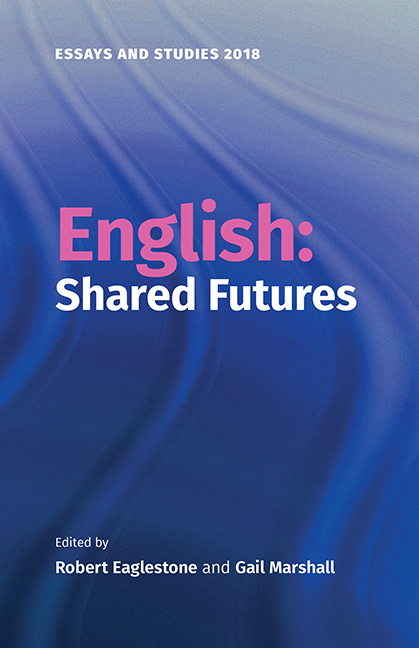Book contents
- Frontmatter
- Contents
- Notes on Contributors
- Acknowledgements
- Abbreviations
- Introduction
- The Changing Picture of School English
- From A-Level to HE: Working Towards a Shared Future?
- English Outreach: Academics in the Classroom
- From Provider to Stager: The Future of Teaching English in HE
- Pedagogic Criticism: An Introduction
- Exquisite Tensions – Narrating the BAME ECA Experience
- Postgraduate Futures: Voices and Views
- Shared Futures: Early Career Academics in English Studies
- Some Reflections on the Funding of English Departments
- English: The Future of Publishing
- Digital Futures
- A View from the United States: The Crisis in the Humanities; the Liberal Arts; and English in the Military Academy
- The Future of Borders
- ‘Between and Across Languages’: Writing in Scotland and Wales
- Exploring Intersections between Creative and Critical Writing: An Interview with Elleke Boehmer
- Integrating English
- Employability in English Studies
- Creative Living: How Creative Writing Courses Help to Prepare for Life-long Careers
- Practice at Large: How Creative Writing can Enhance University Research Environments
- ‘And who can turn away?’ Witnessing a Shared Dystopia
- English and the Public Good
- ‘Can Wisdom be put in a silver rod? / Or Love in a golden bowl?’ On Not Defending the Humanities
- ‘Something Real to Carry Home When Day Is Done’: The Reader in Future
- Afterword
- Index
From A-Level to HE: Working Towards a Shared Future?
Published online by Cambridge University Press: 15 October 2019
- Frontmatter
- Contents
- Notes on Contributors
- Acknowledgements
- Abbreviations
- Introduction
- The Changing Picture of School English
- From A-Level to HE: Working Towards a Shared Future?
- English Outreach: Academics in the Classroom
- From Provider to Stager: The Future of Teaching English in HE
- Pedagogic Criticism: An Introduction
- Exquisite Tensions – Narrating the BAME ECA Experience
- Postgraduate Futures: Voices and Views
- Shared Futures: Early Career Academics in English Studies
- Some Reflections on the Funding of English Departments
- English: The Future of Publishing
- Digital Futures
- A View from the United States: The Crisis in the Humanities; the Liberal Arts; and English in the Military Academy
- The Future of Borders
- ‘Between and Across Languages’: Writing in Scotland and Wales
- Exploring Intersections between Creative and Critical Writing: An Interview with Elleke Boehmer
- Integrating English
- Employability in English Studies
- Creative Living: How Creative Writing Courses Help to Prepare for Life-long Careers
- Practice at Large: How Creative Writing can Enhance University Research Environments
- ‘And who can turn away?’ Witnessing a Shared Dystopia
- English and the Public Good
- ‘Can Wisdom be put in a silver rod? / Or Love in a golden bowl?’ On Not Defending the Humanities
- ‘Something Real to Carry Home When Day Is Done’: The Reader in Future
- Afterword
- Index
Summary
Student transition from post-16 to higher education is a well-established and active area of research, engaging education specialists as well as those working within university and, more rarely, secondary English departments. It is also an issue that has prompted several cross-sector initiatives, many of which serve to put schools and universities in direct touch with one another. My own interest in the interface between the two sectors came from observing the frustrations of a colleague who spent half of her week teaching A-Level English Literature and the other half teaching undergraduates at a pre-92 university: a dual role that was, and still is, highly unusual. Her accounts of some of the misunderstandings, misinformation and mythologizing that persisted on both sides of the divide, prompted me to form the English Association's University Transition Special Interest Group with the aim of fostering and sustaining dialogue between A-Level and university teachers.
I was fully aware when I initiated the group back in 2007 that we were entering potentially choppy waters. Carol Atherton, one of the leading schoolteacher-figures in transition, spoke for many in the teaching profession when she remarked: ‘I get very twitchy about the issue of transition. I am uneasy with the deficit model that it seems to set up: the assumption that students are not adequately prepared for degree level study and that this is because teachers aren't doing their jobs properly.’ Such wariness is not without justification. In the Foreword to David Ellis's illuminating report In at the Deep End? (2008), Jonathan Gibson observes:
In the past, English departments seem, on occasion, almost to have relished the discomfort of new students, seeking to induce a kind of existential trauma. Freshers were told that doing English literature at university would involve a radically new approach to texts, disturbingly different from the old-fashioned nonsense they had been taught at school: it was time to grow up.
Nowadays, with undergraduate recruitment and retention high on most universities’ list of priorities, adopting the de haute en bas attitude noted above would seem more than a little unwise and, while there are doubtless some academics who hold fast to the belief that students arrive stuffed with ‘old-fashioned nonsense’, most manage to hold back from issuing what used to be fairly standard advice to new undergraduates: ‘Unlearn everything they taught you at A-Level.’
- Type
- Chapter
- Information
- English: Shared Futures , pp. 16 - 24Publisher: Boydell & BrewerPrint publication year: 2018

